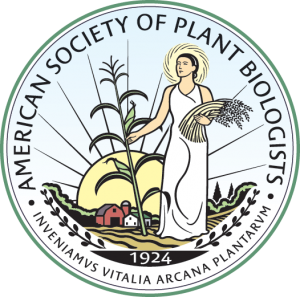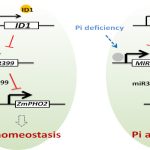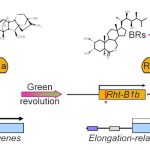Plant Physiology Focus Issue Webinar: Fruit Crops Part 2, July 27
Plant Physiology Webinar: Fruit Crops (2)
Celebrating the July 2023 Focus Issue on Fruit Crops
Recorded Thursday, July 27, 2023
About This Webinar
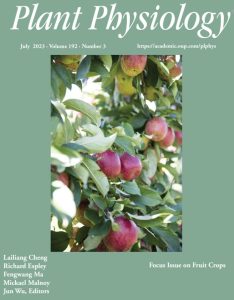 Fruits are major sources of nutrients for humans, and fruit growing is a significant driver for economic growth and development in rural areas and their communities worldwide. The fruit industry faces enormous challenges posed by dramatic changes in global climate, water shortage, and deterioration of the environment. Mechanistic studies have been difficult in fruit crops because of their long juvenility and perenniality. However, recent advances in plant physiology have shed new light on various aspects of fruit crop biology, such as growth, development, ripening, fruit quality, and stress tolerance. The July 2023 Plant Physiology Focus Issue on Fruit crops includes the latest research on fruit crops and highlights current trends and future directions. These advancements not only help us better understand the molecular mechanisms underlying growth and development of fruit crops and their responses to environmental stresses, but they may also offer strategies for the fruit industry to adapt to consumer demands and the changing environments.
Fruits are major sources of nutrients for humans, and fruit growing is a significant driver for economic growth and development in rural areas and their communities worldwide. The fruit industry faces enormous challenges posed by dramatic changes in global climate, water shortage, and deterioration of the environment. Mechanistic studies have been difficult in fruit crops because of their long juvenility and perenniality. However, recent advances in plant physiology have shed new light on various aspects of fruit crop biology, such as growth, development, ripening, fruit quality, and stress tolerance. The July 2023 Plant Physiology Focus Issue on Fruit crops includes the latest research on fruit crops and highlights current trends and future directions. These advancements not only help us better understand the molecular mechanisms underlying growth and development of fruit crops and their responses to environmental stresses, but they may also offer strategies for the fruit industry to adapt to consumer demands and the changing environments.
Focus Issue editors Jun Wu, Lailiang Cheng, Richard Espley, Fengwang Ma, and Mickael Malnoy have organized two webinars to celebrate this topic. This second webinar features speakers Jessica Trinh, Qingmei Guan, and Zefeng Zhai, who share findings from their work appearing in this Focus Issue. The webinar is hosted by Richard Espley and moderated by Assistant Features Editor Aida Maric.
SPEAKERS
 Jessica Trinh: Variation in microbial feature perception in the Rutaceae family with immune receptor conservation in citrus
Jessica Trinh: Variation in microbial feature perception in the Rutaceae family with immune receptor conservation in citrus
Jessica Trinh is a 5th-year PhD candidate in the Gitta Coaker lab at the University of California, Davis. She is researching the evolution of microbial features in vector-borne bacterial plant pathogens to understand how vector-borne pathogens interact with the host’s immune system. She was most recently selected for the 2022-2023 Jastro-Shields Graduate Research Award from UC Davis to fund her conference travel this year. In addition to her research, Jessica is involved in several outreach and science communication programs on campus such as Science Says and the Microbiology Graduate Group’s Diversity, Equity, and Inclusion committee.
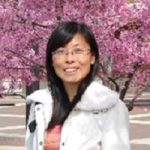 Qingmei Guan. Cold hardening mechanisms of apple trees: Using MdHYL1-MdMYB88/MdMYB124 module as an example
Qingmei Guan. Cold hardening mechanisms of apple trees: Using MdHYL1-MdMYB88/MdMYB124 module as an example
Qingmei Guan is a professor at the Northwest A&F University, China. She received her PhD and postdoc training from the University of Maryland, College Park. Currently, she is leading a research group at the Northwest A&F University as a full-time professor. Her research interests include molecular mechanisms of plant responses to abiotic stress (extreme temperatures and drought stress), and molecular marker-assisted apple breeding at whole-genome level with stress-resistant traits.
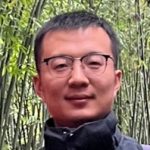 Zefeng Zhai: Abscisic acid-responsive transcription factors PavDof2/6/15 mediate fruit softening in sweet cherry
Zefeng Zhai: Abscisic acid-responsive transcription factors PavDof2/6/15 mediate fruit softening in sweet cherry
Zefeng Zhai received his PhD degree in 2022 from China Agricultural University. His research focused on the molecular mechanism of fruit softening in sweet cherry. He currently works in the Agricultural Genomics Institute at Shenzhen, Chinese Academy of Agricultural Sciences as a post doctor, focusing on the molecular breeding of diploid potato.
MODERATOR
Aida is a postdoc researcher in the Centre for Integrative Biological Signalling Studies (CIBSS) at the University of Freiburg (Germany). She earned a PhD at Barcelona´s Center for Research in Agricultural Genomics (CRAG) before moving to Sjon Hartman´s group in Freiburg in 2022. Aida is interested in all-things epigenetics, currently working on understanding epigenetic control of stress memory. She is excited about science communication which is why she joined the editorial board of Plant Physiology as Assistant Features Editor.
HOST
Richard is a Science Team Leader at Plant & Food Research in Auckland, New Zealand. He was awarded a BSc in horticultural science at the University of Reading and a PhD on the transcriptional control of color in apple at the University of Auckland. His research focuses on the biosynthesis and genetic regulation of plant specialized metabolites, particularly plant pigments. He is interested in how we can use molecular biology to understand and enhance the nutritional and visual qualities. He leads programs in fruit crops, including apple, pear and blueberry.
This webinar and its recording are freely available thanks to the support of the American Society of Plant Biologists. Join today.